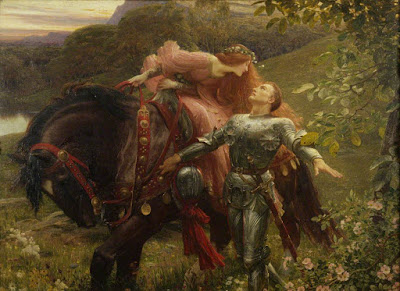 |
| Sir Lancelot, Melissa A. Benson |
Because really, you can only hear "best knight in the world" so many times before you get sick of both the phrase and the person it describes. From his intro to his elegantly repenting death, Lancelot is so perfect it's disgusting. He usurps the stories the second he appears; his arrival at Camelot signals the transition from "exploits of Arthur the warrior king" to "loosely connected vignettes mostly centering on this new French guy." There's no enemy who can face him, and no woman who can avoid falling head over heels the second she sees his exquisite yet manly face. He does exactly one thing wrong in his entire life, and even that had a certain inevitability to it: of course the world's most beautiful woman is going to fall for the best knight.
It's even written into the legends that Lancelot nauseates his fellow knights, who understandably don't get the joke the seventeenth time Monsieur Perfect knocks them out of their saddles. (While in disguise. And then rides away like tournaments are beneath him, when he obviously cares enough to joust in them.) Let's not forget how easy it was for Mordred to gather a band of disaffected knights to surprise him in Guinevere's chamber. Dude did not have a huge fan club.
So here's the thing. If we accept that it's very easy to get bored with Lancelot, the question that never gets asked is: why?
Sort of redundant, yes? Didn't I just answer it?
 |
| The Sword of Lancelot, Howard David Johnson |
One could argue that if it weren't for everyone else's insistence on his perfection, Lancelot would be seen not as irreparably fallen and kind of bland, but as the badass to end all badasses. I'd bet on him versus anyone. Batman? Please. Darth Vader? Don't make me laugh. Lancelot could take out Jaws if he wanted to. Without even using a boat.
 |
| Gawain and the Green Knight, David Hitchcock |
Sound familiar? Perfect knight, fatal weakness, inevitable fall... It's the same story as Lancelot's ill-fated romance with Guinevere. On the outside, he is all that a knight should be; inside, he knows himself to be unworthy.
The difference between them, though, is that Gawain moves on. Humiliated and angry with himself, he tells all of Camelot about his disgrace. But Arthur, demonstrating exactly why he's awesome, gently reminds Gawain of his many accomplishments over the course of the quest, not least of which is the fact that the Green Knight honored him enough to leave him alive. Arthur takes it a step further by declaring that Gawain's green garter, until now a badge of shame, will be regarded by all as a symbol of Gawain's honor and courage in revealing his own weakness.
For obvious reasons, Lancelot cannot do the same. But that's a cop-out, because of course Arthur isn't stupid and already knows about Guinevere. Gawain's declaration allows him to get his failure off his chest, and in fact helps him reclaim the honor he thought he had lost; Lancelot's unwillingness to jeopardize that very same appearance of honor dooms him to cling to his sin. With no expiation, it festers, becoming the central facet of his character, while Gawain is able to grow beyond his misdeed.
 So in addition to being the biggest badass at the Round Table, Lancelot's also got the most emotional turmoil of anyone (except maybe Arthur). Constantly aware of the hypocrisy on which his life is built, hating himself but loving Guinevere more, he has the most fascinating inner life of all the knights. He is a man desperate for perfection who can't help clinging to his one flaw. And he knows it the whole time. He is never allowed a moment to forget the contradiction of himself. He wrestles with it every single day, and always comes back with the same answer: he is not strong enough to reject what is at once the best and worst thing in his life.
So in addition to being the biggest badass at the Round Table, Lancelot's also got the most emotional turmoil of anyone (except maybe Arthur). Constantly aware of the hypocrisy on which his life is built, hating himself but loving Guinevere more, he has the most fascinating inner life of all the knights. He is a man desperate for perfection who can't help clinging to his one flaw. And he knows it the whole time. He is never allowed a moment to forget the contradiction of himself. He wrestles with it every single day, and always comes back with the same answer: he is not strong enough to reject what is at once the best and worst thing in his life.He's not just a badass. He's a relatable badass.
 |
| Lancelot of the Lake, Delphine Gache |
I think it's time we reclaimed Lancelot. It's not going to be easy; his character forms around the very thing that holds him back. But we can definitely start celebrating his feats of arms as the ridiculously awesome career that they are. We can see the good as well as the sinful in his love for Guinevere; it's hard to do justice to the man when we keep dismissing and belittling the passion for which he sacrificed his soul. And instead of complaining about how boring he is, we - and I include myself here - can instead start asking why, for hundreds and hundreds of years, we've kept coming back to his story and finding things in it that touch our hearts.





